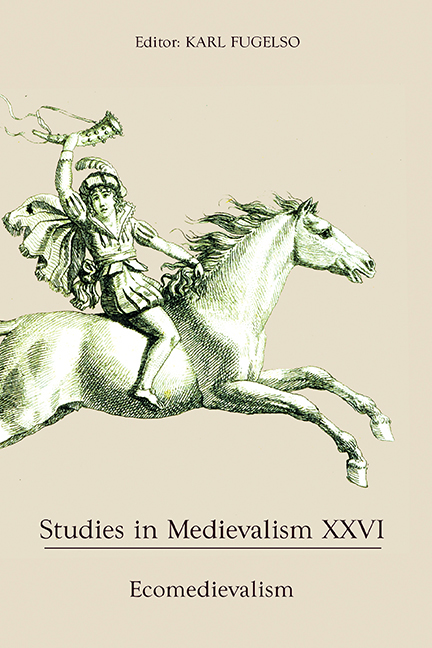Book contents
- Frontmatter
- Studies in Medievalism
- Acknowledgments
- Contents
- List of Illustrations
- Editorial Note
- I Ecomedievalism: Some Perspective(s)
- II Interpretations
- Fragmentary Dreams: John Aubrey's Medieval Heritage Construction
- Charter Horns and the Antiquarian Imagination in Early Modern England
- Giving Voice to Griselda: Radical Reimaginings of a Medieval Tale
- Medieval and Futuristic Hells: The Influence of Dante on Ellison's “I Have No Mouth and I Must Scream”
- Reading Westeros: George R. R. Martin's Multi-Layered Medievalisms
- Modernity in the Middle: The Medieval Fantasy of (Coopted) Feminism in Disney's Maleficent
- Future Medieval: (Neo)Medievalism in Babylon 5 and Crusade
- Cosmopolitan Anxieties and National Identity in the Netflix Marco Polo
- Mapping Everealm: Space, Time, and Medieval Fictions in The Quest
- Medievalisms of the Mind: Undergraduate Perceptions of the “Medieval” and the “Middle Ages”
- Mask of the Medieval Corpse: Prosopopoeia and Corpsepaint in Mayhem's De Mysteriis Dom Sathanas
- Contributors
- Miscellaneous Endmatter
Fragmentary Dreams: John Aubrey's Medieval Heritage Construction
from II - Interpretations
Published online by Cambridge University Press: 15 September 2017
- Frontmatter
- Studies in Medievalism
- Acknowledgments
- Contents
- List of Illustrations
- Editorial Note
- I Ecomedievalism: Some Perspective(s)
- II Interpretations
- Fragmentary Dreams: John Aubrey's Medieval Heritage Construction
- Charter Horns and the Antiquarian Imagination in Early Modern England
- Giving Voice to Griselda: Radical Reimaginings of a Medieval Tale
- Medieval and Futuristic Hells: The Influence of Dante on Ellison's “I Have No Mouth and I Must Scream”
- Reading Westeros: George R. R. Martin's Multi-Layered Medievalisms
- Modernity in the Middle: The Medieval Fantasy of (Coopted) Feminism in Disney's Maleficent
- Future Medieval: (Neo)Medievalism in Babylon 5 and Crusade
- Cosmopolitan Anxieties and National Identity in the Netflix Marco Polo
- Mapping Everealm: Space, Time, and Medieval Fictions in The Quest
- Medievalisms of the Mind: Undergraduate Perceptions of the “Medieval” and the “Middle Ages”
- Mask of the Medieval Corpse: Prosopopoeia and Corpsepaint in Mayhem's De Mysteriis Dom Sathanas
- Contributors
- Miscellaneous Endmatter
Summary
The English antiquary John Aubrey (1626–97), deeply concerned about the fate of fragmentary artifacts and distressed by the wartime destruction of religious monuments, set out to rescue the past by collecting premodern records and stories from many villages and arranging them into patterns of national significance. Aubrey himself published very little, but he circulated his work among friends in the newly formed Royal Society who were also engaged in collecting and organizing bits of knowledge in order to explain the natural world and, implicitly, the changing social world. His reconstruction of the medieval past is directed toward his own time, but most of his material was not read widely until it was edited and published by his intellectual inheritors, the antiquarians and folklorists of the eighteenth and nineteenth centuries. His work never entirely disappeared, reappearing to remind scholars that the science of antiquarian research was as much a cultural definer of early modernity as the establishment of the physical sciences. Both the difficulty and the joy in reading Aubrey lie in deciphering the indexical puzzle he presents so engagingly. In order to develop a fuller recreation of English medieval heritage after the physical and cultural destruction of the English Civil Wars, Aubrey tried to combine manuscripts, physical ruins and landscapes, and local popular traditions.
In the aftermath of the turmoil and change of the Civil Wars, Aubrey attempted to recuperate what remained from earlier times. The temporally determining phrase he repeats most often is “before the Civil-warres.” This phrase, including his own youthful recollections and those of his older friends and relatives, marks a world of traditions, church survivals, and closer social relationships. Although Great Britain did not exist as a political entity until 1707, Aubrey followed the example of William Camden and other antiquarians in using the idea of “Britain” as specifically describing the early history of the island in the time of the Celts and Roman occupation, and more generally the idea of the country's past.
- Type
- Chapter
- Information
- Studies in Medievalism XXVIEcomedievalism, pp. 45 - 66Publisher: Boydell & BrewerPrint publication year: 2017

